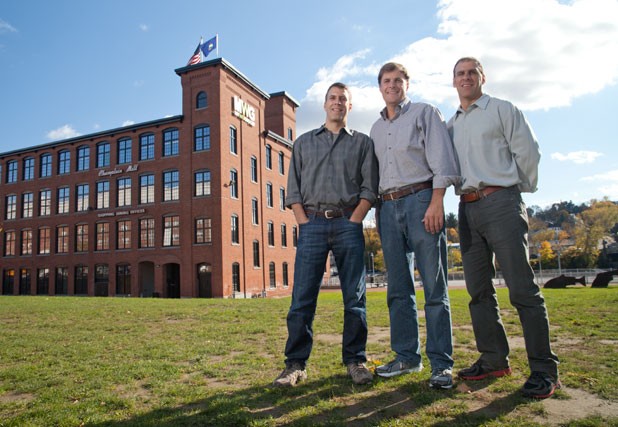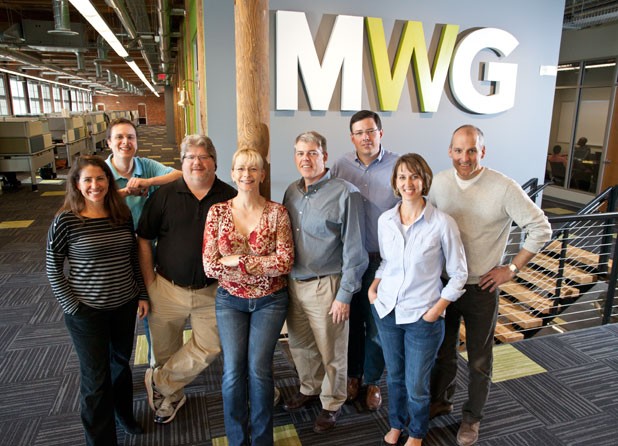Published October 24, 2012 at 11:15 a.m.
The fifth-floor reception area of MyWebGrocer in Winooski was packed with reporters, TV cameras, local techies and other dignitaries last week as Jerry Tarrant stepped up to the microphone to introduce Gov. Peter Shumlin. The governor chose MyWebGrocer as the venue for his press conference, ostensibly to promote Information Technology Month, last weekend’s Hackathon and this weekend’s Vermont Tech Jam expo and job fair.
Two-and-a-half weeks before the election, Shumlin also probably liked the idea of aligning himself with a successful, high-tech firm that’s growing jobs in Vermont — and few companies are doing that as successfully as MyWebGrocer. Founded 12 years ago by brothers Jerry, Rich and Brian Tarrant, the online shopping and marketing firm has been on a hiring streak lately. In 2012 alone, the company added 60 new employees, bringing its workforce to a grand total of 180. Two of those employees — both earlobe-plug-sporting young men — spoke at last week’s press conference. The company has more than two dozen Champlain College grads on staff.
MyWebGrocer now occupies two floors and 50,000 square feet of the historic Champlain Mill it purchased and renovated in June 2011; the company plans to keep much of the building vacant to allow for future growth as it expands in Europe, New Zealand and elsewhere around the world. According to Brian, the brothers envision the Champlain Mill eventually becoming a technology hub for all of Chittenden County.
Jerry, the oldest Tarrant brother, ran last week’s press conference. Although he still looks like the pro hockey player he once was — Jerry, 46, skated with the New York Rangers, Calgary Flames and Ottawa Senators organizations — he usually cedes the center ice to his younger brother, Rich Jr., 45, who’s the CEO and public face of MWG. If he hadn’t been traveling that week, Rich Jr. would probably have been at the podium.
The three brothers — all equal partners in MWG — have a working relationship that is not unlike the dynamic of a sports team. Each seems to approach his role with drive and determination but also with an egoless appreciation of what other key players bring to the game. Jerry, MWG’s chief financial officer, is often credited with hatching the idea for MyWebGrocer. But neither he nor his brother Brian, 42, is listed on the company’s website as part of the senior management team.
“For MyWebGrocer, Rich is the CEO, and Brian and I respect that,” Jerry explains. “A company has to have a captain and a leader.”
MWG’s no-star approach may also be a reaction to the high-profile intensity of the man who spawned these three sons — and two daughters, neither of whom is involved in the family business. Patriarch Richard E. Tarrant Sr. cofounded IDX Systems of South Burlington and later sold the health care software company to General Electric in 2005 for $1.2 billion. A year later, he ran for the U.S. Senate on the Republican ticket and lost badly to then-Rep. Bernie Sanders in what is still considered to be the most expensive statewide race in Vermont history.
Privately held, MyWebGrocer isn’t required to report its revenue figures, though Jerry says the company has been growing at an annual rate of 40 percent for the last five years. By its own choosing, MyWebGrocer isn’t included in Vermont Business Magazine’s annual “Book of Lists,” which ranks Vermont employers by size, revenues and growth rate. As Rich puts it, “There is very little value in disclosing those metrics publicly.”
Jerry agrees, saying he and his brothers “don’t like to call too much attention to ourselves.”
Paul Plunkett, a senior vice president at Hickok & Boardman of Burlington, has been providing commercial insurance to the Tarrant brothers since 1994, when they founded their first joint venture, Amicus Healthcare Living Centers, for patients with dementia.
“These are very modest individuals who want to fly under the radar,” Plunkett says. “At the end of the day, it’s not about them. It’s about MyWebGrocer. That’s their emphasis.”
Indeed, while many family-owned partnerships fail due to sibling squabbles, the Tarrant brothers thrive by divvying up management duties according to each of their respective strengths: Jerry is the numbers guy. Rich is the CEO and chief salesman. Brian is the manager of the physical plant and is the behind-the-scenes strategist.
“We work really well together. A lot of families don’t,” says Brian. “Sure, we have our quibbles every now and then, but mostly we’re arguing around the margins. It’s always been a democracy with us.”
Rich echoes that sentiment. “The competition is to win and be successful as an organization, not to compete with each other within the organization,” he says. “We work hard at reminding employees that MWG is one team.”
*****
The Tarrant siblings grew up on Ledge Road in Burlington’s Hill Section. All three boys attended Rice Memorial High School in South Burlington, and later, the University of Vermont.
Like their dad, an all-American basketball player at St. Michael’s College who was drafted by the Boston Celtics, they were all competitive college athletes. Rich and Brian played hoops together at UVM under then-head coach Tom Brennan (Rich was team captain); Jerry skated for UVM’s hockey team before going pro in the U.S. and Europe.
They followed their father into business, too, but not on his coattails — or his line of credit. Brian says Tarrant Sr. wouldn’t let any of his kids work for him at IDX, nor would he let them invest in IDX stock once the company went public. The latter precaution, Jerry explains, was in part to avoid accusations of insider trading.
“We were raised learning that you had to earn it on your own and don’t expect any handouts,” Brian recalls. “I had a lawn-mowing business in fifth grade and he wouldn’t even let us mow the lawns over there.”
All three brothers earned their business degrees at UVM before going their separate ways, albeit briefly. In 1993, Brian headed to San Diego, where he says he played a lot of volleyball, tended bar and began exploring prospective business avenues in a field then in its infancy: assisted living.
In those years, Brian says, specialized-care facilities for patients with Alzheimer’s and other forms of dementia were still somewhat rare. As Brian recalls, a lot of developers who were building nursing homes made the mistake of treating them as real-estate ventures rather than what they actually are: health care facilities. Not surprisingly, many went bankrupt.
Around that same time, Brian’s older brother, Rich, was working in New York City at a brokerage firm handling health care properties such as hospitals and nursing homes. It was there, Brian says, that Rich gained unique insights into assessing the value of such facilities, knowledge that ultimately proved useful when the brothers launched Amicus.
“We had the idea that we could provide assisted living better than the alternatives that were out there,” says Jerry, who spent his hockey off-season educating himself about long-term health care. “What we all found was, this was a population that was falling through the cracks. There wasn’t something really dedicated to these folks.”
It would have been logical for the brothers to turn to their father, who’d made his fortune in the health care industry, to invest in their joint venture. The old man offered them advice but no financial help. The brothers had to pool their resources and find other start-up capital on their own in order to get Amicus off the ground.
“We got turned down from our first bank locally,” Brian recalls. “If my dad was on that note, we probably would have gotten the loan no problem.” Brian won’t reveal the name of the bank but adds, “they’re still here.”
At its peak, Amicus had about 300 employees and 300 beds at five facilities in Massachusetts and Connecticut. While Jerry and Brian ran the business, Rich founded Nationwide Health Care Advisors, which handled mergers and acquisitions of similar properties.
The Tarrants put a lot of sweat equity into their facilities. “We were talking to each other on Christmas Eve making sure we had good coverage,” Jerry says of the staffing challenges. “You don’t get that at the big corporations.”
Brian adds, “It was a lot of 3 a.m. phone calls.”
Ultimately, Amicus proved unsustainable for the Tarrant team. Brian says he was spending too much time on the road at the expense of his family back in Vermont. For Jerry, it was the litigious nature of the health care industry that ultimately turned him off.
“Everything was about liabilities,” Jerry recalls. “All you have to do is drive down the I-93 corridor and all you see are billboards: ‘Has your loved one been hurt in a nursing home?’”
By the time of the dotcom boom, in the late 1990s, the brothers were eyeing the internet for their next business opportunity but were unsure on a specific area of focus. After about six months of kicking around ideas, Brian recalls, Jerry mentioned online grocery shopping.
Initially, Brian says, the brothers assumed they were too late to get into that business — until they did some research. What already existed was Webvan, an online credit and grocery delivery business, which went belly up in 2001 in what’s considered one of the biggest dotcom flops in history.
According to Brian, Webvan had a terrible business model. The company built its own warehouses and delivery fleets in an industry notorious for low profit margins.
MyWebGrocer took the opposite approach. Its concept was to let the supermarket chains manage their own infrastructure while MWG would become the online grocery shopping — or OGS — software company supporting their sales.
In 2000, the Tarrants founded MyWebGrocer with help from Tim Kenney, a high school friend who had worked at IDX. At the time, Kenney was CEO and founder of a Vermont software company called NYBOR Corporation. While none of the Tarrants “wade into the weeds” of writing computer code, Kenney describes Rich as a “product designer” who plays an active role in quality control.
As Brian tells it, they approached Kenney with the idea for MWG and negotiated a deal with him to do create a mock-up demo. They sold the software to their first client, Geissler’s Supermarkets in Connecticut, before the system was even up and running.
Because Kenney built it all at a discounted rate, “we gave him shares,” Brian says, admitting, at the start, “It was all a bit of smoke and mirrors.”
Today, Kenney is chief operating officer of MyWebGrocer, now the nation’s largest provider of digital grocery services. Its clients include some of the biggest names in the supermarket industry, including Kroger, A&P, Winn-Dixie, Albertson’s and Price Chopper.
Kenney’s take on the Tarrants? While they’re aggressive, he says, they’re also “business conservative, which is the reason why they’re able to achieve this kind of growth without gigantic sums of extra capital coming in.” In short, he adds, they run a profitable business that grows only as their profits do.
“That was the philosophy at IDX,” Kenney adds, “and I think it’s the philosophy here.”
L to R: Michelle Cote, Marlon Branicki, Jeff Downs, Sophie Huang, Tim Kenney, Alec Newcomb, Heather Drake, Curt Alpeter. Photo by Matthew Thorsen.
While Tarrant Sr. had no financial involvement in getting MWG off the ground, he has served as a reliable sounding board for ideas. According to Kenney, it’s not uncommon to see the elder Tarrant in the office. His own company, Marathon Health, which provides health care to large, self-insured businesses and municipalities, is right downstairs, on the fourth floor of the Champlain Mill.
All three sons say their father’s input has been invaluable to their success.
“My favorite line of his, ‘The harder you work, the luckier you get.’ That’s what I believe in,” says Jerry. “I’m not super smart, but I feel like I can outwork anyone.”
Others are less modest about the siblings’ smarts.
“I think the world of those guys,” says Bob Bloch, director of the Bring Your Own Business program, which helps young entrepreneurs at Champlain College develop their businesses. “It’s unusual for a second generation to reach the same level of success as their dad, but they’ve really made their mark as entrepreneurs.”
There are two areas in which the Tarrants are not likely to follow Rich Sr. After living through the experience of their father’s bruising senatorial campaign of 2006, none expresses any desire to run for elected office.
“It was hard,” Jerry admits. “You went from having a dad that everyone liked when he was the president and CEO of IDX, which was a large employer and gave a lot of money to charity.” (Tarrant Sr. has been a generous philanthropist, especially to higher ed, as evidenced by the buildings at Champlain College and St. Michael’s College that bear his name.) “Then as soon as he ran as a Republican, he was the devil to half the state. That’s a hard thing to take.” Or, to explain to his kids, apparently.
Rich sounds equally soured on electoral politics.
“I would not say that our political system is conducive to making tough decisions or getting anything done,” Rich says, “with the exception of re-election, which seems to drive all decisions in politics.”
To date, none of the brothers has tried too hard to sway the political process with his checkbook. Unlike their father, who’s donated more than $25,000 to the Republican Party and several of its candidates since 2007, the younger Tarrants don’t appear in any recent Federal Election Commission filings. Prior to that, Brian and Rich each gave $1000 to GOP House candidate Martha Rainville, and Jerry donated $1000 to the 2004 Bush-Cheney campaign.
Another paternal path that doesn’t appeal to the Tarrant brothers: taking their company public. When asked if there’s an IPO in MyWebGrocer’s future, Jerry is unequivocal: “God, no!” he says, remembering all the stress his father experienced after IDX went public.
“The pressure he felt of letting down investors, letting down friends and people in the community ... It’s a lot of pressure,” he says. “He couldn’t tell them if he was going to miss a number. And you’ll miss a number eventually, unless you’re cheating.”
Of course, there’s no reason to cheat when you’re winning. And from the looks of it, the Tarrants have every reason to be all in — and enjoying — the game.
MyWebGrocer is hosting the Vermont Tech Jam, Friday and Saturday, October 26 and 27, at the Champlain Mill in Winooski. Info, techjamvt.com.
More By This Author
About the Artist

Matthew Thorsen
Bio:
Matthew Thorsen was a photographer for Seven Days 1995-2018. Read all about his life and work here.
Matthew Thorsen was a photographer for Seven Days 1995-2018. Read all about his life and work here.
Speaking of...
-

Bernie Sanders Calls for Joe Biden to Stay in the Presidential Race
Jul 13, 2024 -

Welch Calls for Biden to Withdraw From Presidential Race
Jul 10, 2024 -

Sitting Vermont Sen. Dick Sears Has Died
Jun 2, 2024 -

Sen. Bernie Sanders Has Become a Leading Critic of Israel’s War in Gaza
May 29, 2024 -

Longtime Vermont Senator Richard 'Dick' Mazza Dies
May 27, 2024 - More »
Comments
Comments are closed.
From 2014-2020, Seven Days allowed readers to comment on all stories posted on our website. While we've appreciated the suggestions and insights, right now Seven Days is prioritizing our core mission — producing high-quality, responsible local journalism — over moderating online debates between readers.
To criticize, correct or praise our reporting, please send us a letter to the editor or send us a tip. We’ll check it out and report the results.
Online comments may return when we have better tech tools for managing them. Thanks for reading.














































